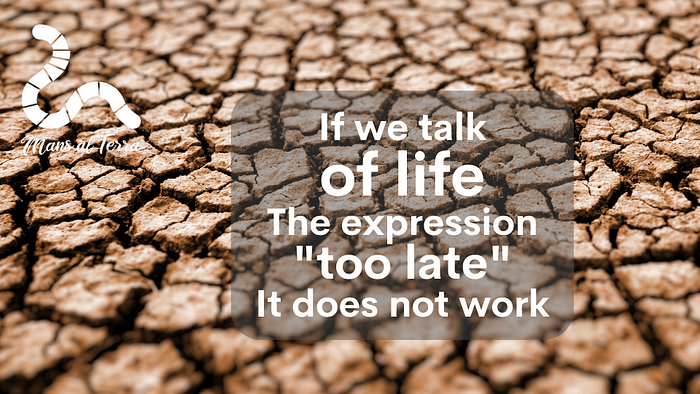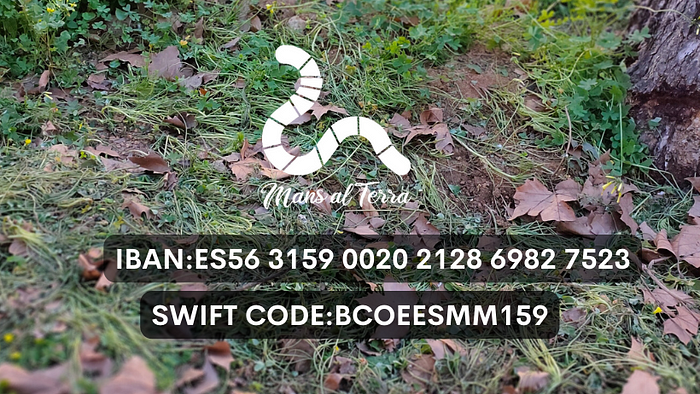
-
7
Subscribers -
45.00 €
monthly -
1,606.85 €
total
-
7
Subscribers
Land ownership, a lever for transformation
Soil is a living being that most people see as a mere inert object, a simple container in which we deposit everything that is useful and useless to us
To deal with a problem we first need to be aware of its existence. Once we are aware of it, if we really want to solve it, we need to act on its causes, its roots, instead of focusing on its consequences.
An example of this is what happens with soil. Soil is a living being that most people see as a mere inert object, a simple container in which we deposit everything that is useful and useless to us.
The consequences of this? Loss of biodiversity, lack of water retention capacity, lack of CO2 retention capacity with the impact this has on global warming, shortage of nutrients to transfer to the food we eat… we could go on writing lines and lines.
Are we aware of this problem? Largely no. The stories we receive from the mass media, which have a major influence in shaping the majority of people’s thinking, tell us about it only rarely. You have to realise the problem yourself and search forums and social networks for information about it.
An example of this is what happens with soil. Soil is a living being that most people see as a mere inert object, a simple container in which we deposit everything that is useful and useless to us.
The consequences of this? Loss of biodiversity, lack of water retention capacity, lack of CO2 retention capacity with the impact this has on global warming, shortage of nutrients to transfer to the food we eat… we could go on writing lines and lines.
Are we aware of this problem? Largely no. The stories we receive from the mass media, which have a major influence in shaping the majority of people’s thinking, tell us about it only rarely. You have to realise the problem yourself and search forums and social networks for information about it.

And what is the root of this problem? the use of fertilisers and pesticides? uncontrolled urbanisation? landfills? monoculture? extensive agriculture and cattle farming? ….
Once again we could write lines and lines about it, focusing as usual on the consequences and not on the causes.
If we look calmly and with an open mind we will see that the problem is the model of land ownership that our society has accepted. A model of ownership that gives rights but does not demand responsibilities. A model of ownership that has placed in the hands of a few people parts of our lives that are essential for the collective good. A property model that robs us of the sovereignty to live and places it in the hands of those who have created it and defend it through stories, through a narrative that colonises the minds of many people who do not believe that there is any other possible model.
It is essential that we return to a model of common ownership of the land, to give responsibility for it to those people, collectives or companies that use it on the basis of its regeneration and care. Projects that give life back to the soil and thus give back to us the sovereignty of our lives.
Mans al Terra takes as its ultimate purpose the return of the soil to its freedom as opposed to the liberalisation of its use for purely economic purposes that prevails today. In order to do so, it aims to act on the root of the problem, on land ownership.
It is naïve to think that we can confront this ownership model and its advocates. The strategy is different: use it.
A collective fund has been created through which to pool the resources obtained by the participation of people who decide to go beyond the like on Instagram or Facebook. This fund will be used to carry out a continuous process of collecting land that will subsequently be made available to groups and organisations with projects whose sustainability is based on land regeneration, in the form of a transfer of use.
The ownership model, based on the rights granted by private property, allows us to create a large-scale space in which to freely decide on the establishment of a system of ownership of the commons based on collectively constructed internal regulations. The form of ownership that will accommodate this is a form of collective ownership based on a foundation yet to be established.
Currently Mans al Terra is an association created to create and build this community which we invite you to join. The aim of the creation of this entity is the dynamization of the whole process: creation of the community and purchase of the first lands, constitution of the Foundation.

Become a Solidarity Socio-environmental Participant.
A community of Solidarity Socio-environmental Participants is being created to carry out this work. Providing funds, spreading the message, working on soil regeneration, contributing and leading initiatives and ideas.
So far, two groups have been formed and Mans al Terra has provided them with land where they can learn and develop their self-consumption project. One of the keys is the construction of a resilient and capable community with the necessary knowledge to transform barren land, or land that has been worked from an agro-industrial point of view for many years, into new living and biodiverse spaces where healthy and nutritious food can be obtained from processes that respect the soil. Knowledge that the Del Camp a la Taula association provides in open source mode in the same way that many other entities provide in other territories in other countries. Just look for them. I guarantee they are there.
The riches that healthy soil shares with us go far beyond food. The capture of CO2, certifiable and monetisable through the Voluntary Market that incentivises carbon capture projects through the acquisition of these certificates. Or the increase in rainwater capture, or the non-existence of pests in crops thanks to the ecosystem balance that is achieved, or …. again, we could write lines and lines of benefits.
For all this to be viable, it is necessary to scale the project to another level. You are needed, you are needed, we are all needed. Turn off the TV, get up from the sofa, if only to share this with the people around you, and let’s change the story together. Let’s start talking about what is important for everyone: life and its regeneration.
Find out more on +34 631 345 465, at [email protected], on the mansalterra.org website, on Instagram @mansalterra, find out more and go one step further. Participate, contribute resources. It doesn’t matter if it’s with a bizum of 2 euros or a transfer of 2000. The important thing is that you take part.
Become a Solidarity Socio-environmental Participant.

Become a Solidarity Socio-environmental Participant.
Write a comment
Log in with your account or sign up to add your comment.